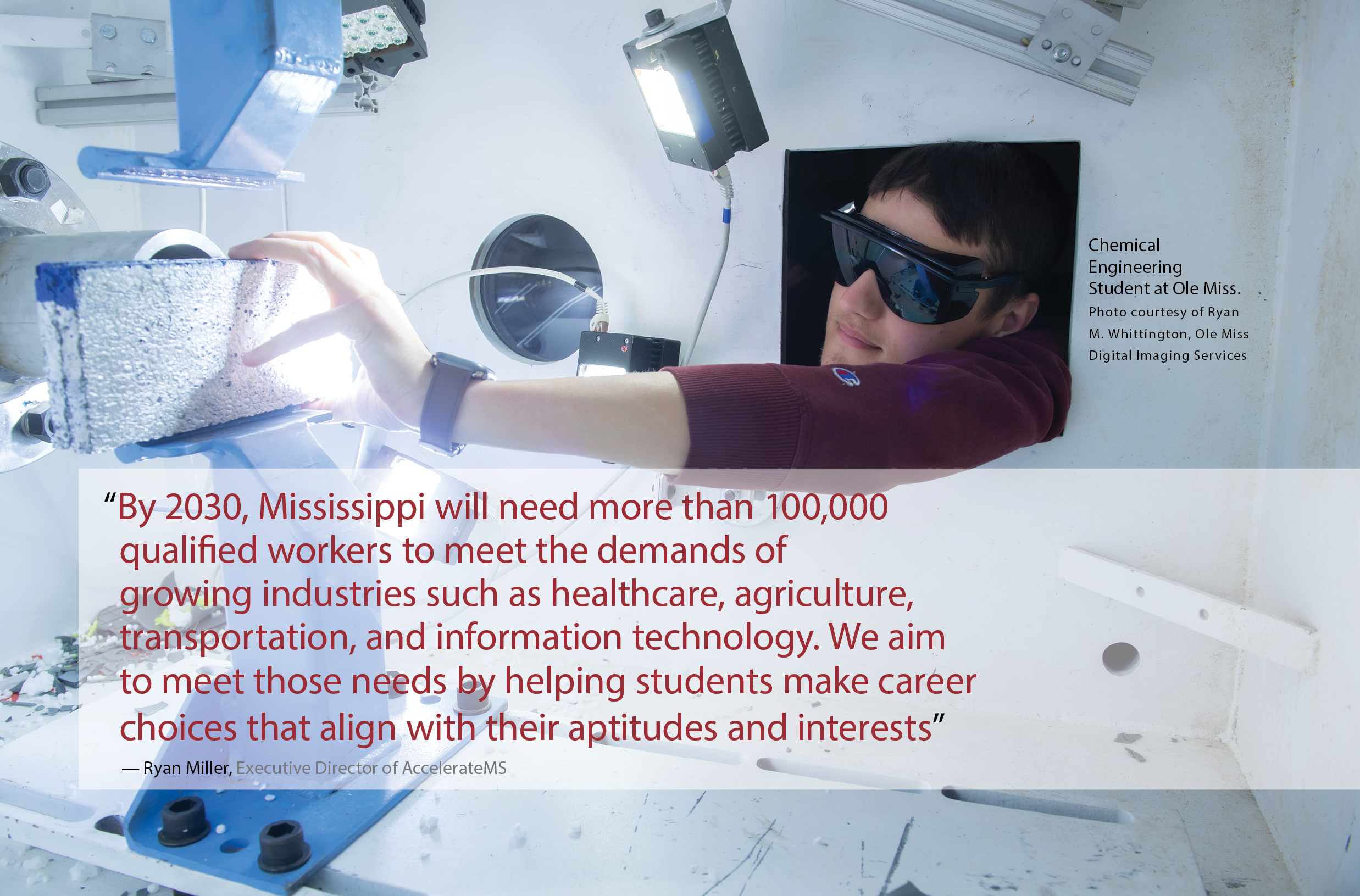At the Mississippi Economic Council’s 71st Annual Meeting in 2021, Governor Tate Reeves announced plans to pivot Mississippi’s economic focus toward strengthening its workforce. Two years later, Governor Reeves delivered on that promise by expanding education-based initiatives and investing millions of dollars into the state’s university system and training programs.
Initiatives such as Ascent to 55% have been instrumental in growing the number of individuals in Mississippi educated beyond high school. As suggested in the name, this project strives to increase the percentage of Mississippi workers with college degrees and industry certifications to 55% by 2030 and 60% by 2035. With the state’s rate for post-secondary attainment sitting at 45.2%, 6% below the national average, the Ascent to 55% initiative is taking significant steps to rewrite this statistic.
In December 2022, the Mississippi Economic Council (MEC) and AccelerateMS, the state’s lead office for workforce development strategy and delivery, embarked on an eight-stop listening tour to gather vital information for Ascent to 55%’s workforce development strategies.

In support of these efforts, Mississippi has made numerous investments in training programs across the state. In July 2022, AccelerateMS allotted $1.7 million in grants to Pearl River Community College’s (PRCC) job-training program. When the award was announced, Governor Reeves stated that $1.1 million would go toward manufacturing and commercial truck-driving training, and the remaining $671,000 would expand PRCC’s healthcare training programs.
A few months later, in October 2022, an investment of $2.2 million went to Northeast Mississippi Community College. This funding will also enhance training programs and strengthen the local workforce.
Investments have also been aimed at implementing workforce preparation in high schools. AccelerateMS awarded almost $8 million in grants to seven regional development districts to aid in recruiting, hiring and placing career coaches in approximately 125 schools.
“We believe that access to one-on-one career coaching will open the eyes of Mississippi high school students to the kinds of high-tech, high-skill jobs available right here at home,” said Ryan Miller, executive director of AccelerateMS. “By 2030, Mississippi will need more than 100,000 qualified workers to meet the demands of growing industries such as healthcare, agriculture, transportation and information technology. We aim to meet those needs by helping students make career choices that align with their aptitudes and interests.”
From Students to Skilled Workers
As a result of the statewide focus on education, Mississippi’s colleges and universities have begun to see an uptick in enrollment. The University of Mississippi, commonly known as Ole Miss, reports approximately 22,967 students enrolled in 2022, a 5% increase from 2021. That number includes the largest freshman class in the university’s history, 4,480 students.
Starkville’s Mississippi State University (MSU) reached record enrollment growth for its seventh consecutive year, with 23,086 students enrolled for the fall 2022 semester. Ninety-seven percent of MSU’s 2020-2021 graduates reported receiving employment offers or working on advanced degrees within six months of graduating.
Alongside growing its enrollment rate, MSU also broke its record for research expenditures in FY20 with $280 million invested, which accounts for approximately 55.4% of Mississippi’s total R&D expenditures ($506.6 million). This May, the MSU-led initiative, “Advancing autonomous technologies for advanced manufacturing in Mississippi,” was awarded $1 million from the U.S. National Science Foundation’s Innovation Engines program.
“Research and innovation are crucial for our nation’s future, and Mississippi is poised to be a leader,” U.S. Sen. Roger Wicker said. “One important provision of the CHIPS and Science Act helps ensure that our universities can compete and make valuable contributions on the global stage.”
With eight public universities, four research institutions and 15 community colleges, Mississippi’s higher education network plays a significant role in the state’s economy. According to a 2023 study by the University Research Center, Mississippi’s public university system had an economic impact of over $6 billion in 2020. The university system also supports approximately 80,280 jobs through direct, indirect, and induced employment. By 2030, higher education in Mississippi is slated to make an economic impact of $8 billion and employ 98,801 people.
Securing a Local Workforce
Through supporting higher education attainment, Mississippi aims to bolster graduate retention by creating more jobs with competitive wages. To achieve this, state leaders have worked to attract multiple expansion projects, such as an Amazon fulfillment center in Canton which added 1,000 new jobs, and a Walmart fulfillment center in Olive Branch, which added 250 supply chain jobs.
According to the Mississippi Economic Development Council, (MEDC) nearly 22,000 jobs were created in 2022. With major projects on the horizon — including the largest economic development project in the state’s history, a $2.5 billion corporate investment by Steel Dynamics that is set to create 1,000 new jobs — MEDC estimates that approximately 44,000 additional jobs are expected to arise in 2023, a 3.8% growth rate.
Legislation to Strengthen Education
In April, Governor Reeves announced that he signed multiple pieces of legislation to support AccelerateMS.
“You don’t have to look all that closely to see that a trend is emerging in Mississippi. That trend is more learning and greater academic achievement. It’s better jobs and higher pay. And its strong economic growth and more opportunity for all Mississippians across our state,” said Governor Reeves.
The signed legislation includes Senate Bill 3021, a $12 million appropriation to expand the state’s career coaching program by an estimated 50 additional coaches; Senate Bill 3113, a $25 million appropriation to scale and support Allied Health Training Programs and provide $3 million for the new AccelerateMS Physician Residency and Fellowship Start-Up Grant Program; and lastly, House Bill 588, a proposed extension for the repeal on the Mississippi Comprehensive Workforce Training and Education Consolidation Act until 2026.
When the Mississippi Comprehensive Workforce Training and Education Consolidation Act was passed in 2004, it established the Office of Workforce Development and State Workforce Development Investment Board to “reduce fragmentation and duplication of services” across varying skill training programs and promoted workforce development throughout Mississippi
With these projects, plans and legislation in place, a new era for Mississippi’s workforce has taken root. In March 2023, the state’s unemployment rate reached an all-time record low of 3.5%.
“The future of Mississippi’s economy is being decided today,” said Governor Reeves. “We’ve made a record investment in workforce development, and because of that, our state’s unemployment rate is at an all-time low, and more Mississippians are working than ever before. We need to double down on preparing Mississippians to take on the jobs of the next 50 years, and that’s what we are doing. Our people are the state’s greatest asset, and we will continue to invest in them.”
Mpower 2022 pep rally
Photo courtesy of Ryan M. Whittington, Ole Miss Digital Imaging Services


